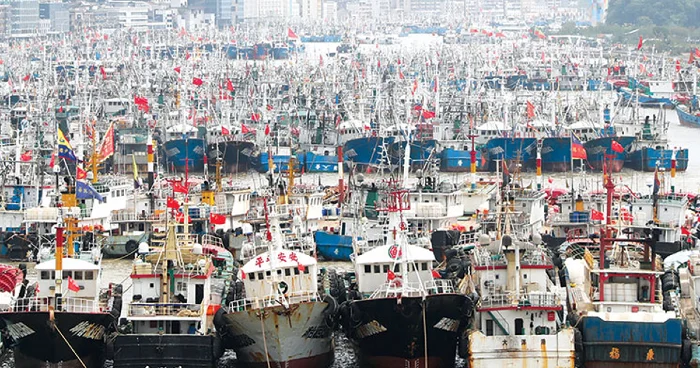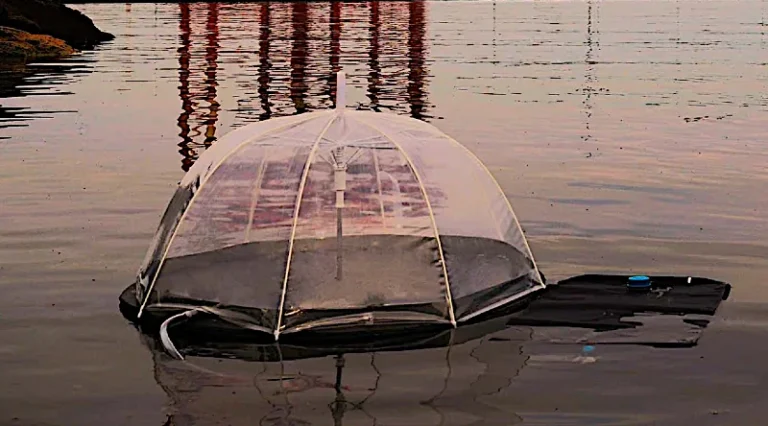The Scale and Scope of China’s Fishing Fleet
Recent investigations into China’s fishing activities have exposed a troubling reality. The country’s vast fleet, now the world’s largest, has expanded its reach far beyond its own waters. After depleting local fish stocks in the early 2000s, China’s fleet, buoyed by government subsidies, has grown significantly.
Calculating the exact fleet size is problematic, as China often conceals fishing boat ownership.
These fleets, operating continuously in large groups, now extend across various oceans – from the Atlantic to the Pacific, and even around Antarctica.
Environmental Catastrophe in Global Waters
A critical 2015 study highlights a disturbing 50% decline in ocean life over the past half-century. United Nations data indicates that about 90% of the world’s fish stocks are now fully exploited, overexploited, or depleted.
The fleets, targeting a vast array of species like squid and sharks, are effectively strip-mining the oceans.
This not only threatens marine biodiversity but also robs billions from coastal nations, impacting the livelihoods of local communities and national economies.
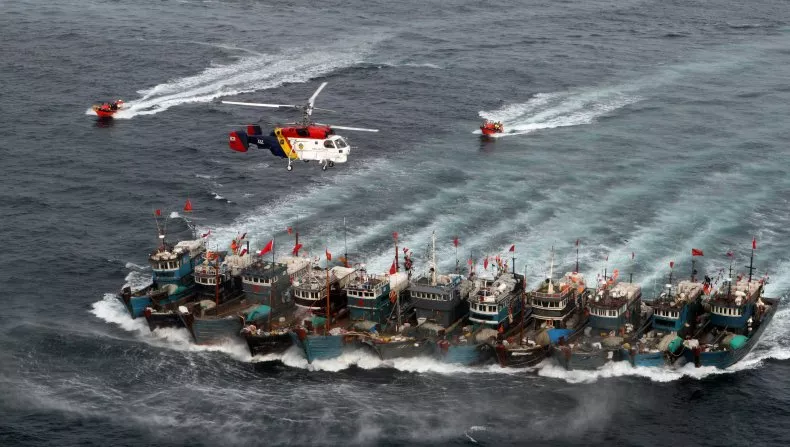
China’s Predatory Tactics and IUU Fishing
The SeaLight project report and other studies have shed light on China’s practices, revealing how its fleet often engages in Illegal, Unreported, and Unregulated (IUU) fishing. According to the report, such activities have been described as “theft on a grand scale, unrestricted warfare on natural resources.”
These fleets frequently operate in the exclusive economic zones of other countries, flouting international laws. Techniques include dragging massive nets and capturing everything in their path, often with little regard for legal or environmental considerations.
China-flagged ships are deeply implicated in illegal, unregulated, and unreported (IUU) fishing activities across the Asia-Pacific, encroaching upon the exclusive economic zones (EEZs) of other nations.
An EEZ, as defined in the 1982 U.N. Convention on the Law of the Sea, extends 200 miles from a country’s coast, granting exclusive resource exploitation rights. Admiral Linda Fagan, the U.S. Coast Guard commandant, highlighted the plight of smaller island nations unable to defend their EEZs against China’s might.
With over half a million vessels, China’s fleet is the world’s largest, and as Adm. Fagan points out, “one of the worst offenders” of IUU fishing.
Manipulative and Covert Operations
To evade detection, Chinese vessels sometimes disable their Automatic Identification System (AIS) signals, especially when entering other nations’ EEZs. This tactic allows them to exploit resources clandestinely and then reactivate their AIS upon leaving. Reports indicate that in 2019, nearly 90% of 300 fishing boats ‘going dark’ near Argentina’s EEZ flew the Chinese flag.
Illegal fishing constitutes the sixth most lucrative global criminal economy, with estimated revenues of $32 to $36 billion, according to a 2017 report by Global Financial Integrity. China is the reigning global leader with illegal operations throughout Asia, Africa, and Latin America.
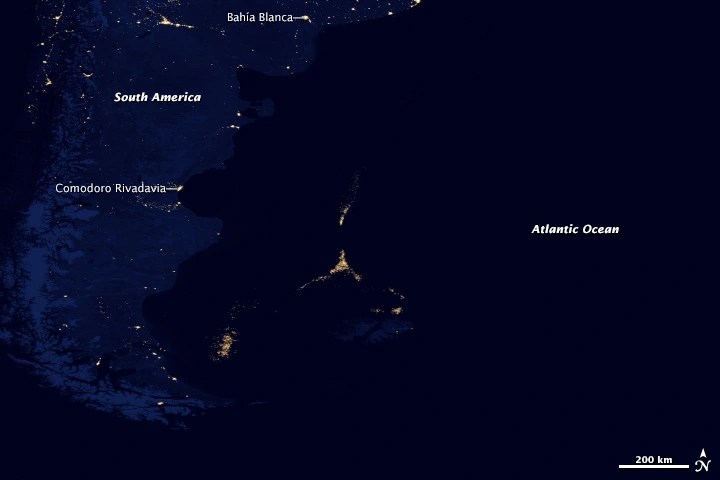
The Dire Cost of Overfishing
China’s fleet significantly contributes to bottom-trawl fishing, responsible for 28% of the global trawl catch. This method, involving nets dragged along the seafloor, devastates marine habitats, as the U.S. Geological Survey notes, by destroying bottom-dwelling flora and fauna. SeaLight documents not only overfishing but also the Chinese fleet’s intimidating tactics against other nations’ vessels.
China’s South China Sea Strategy: Ecological and Political Ramifications And China’s Broken Promises
China’s aggressive territorial claims in the South China Sea, including artificial island-building, have led to considerable environmental damage. From 2013-2015, China claimed over 3,000 acres on Spratly Islands’ reefs, impacting local fisheries and ecosystems. Despite promises to the contrary, China has militarized several artificial islands, intensifying regional disputes.
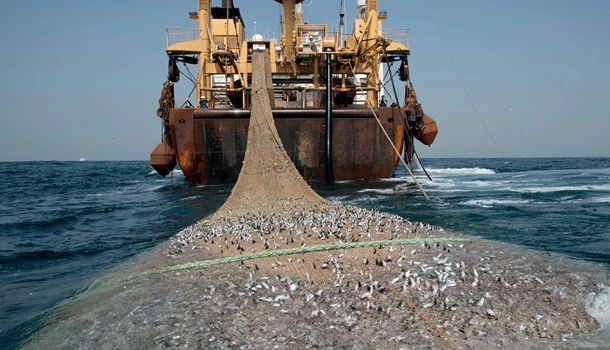
Global Reaction and the Need for Action But No One Is Willing To Take On China
The United States and other nations have recognized the seriousness of IUU fishing, not just as an environmental hazard but also as an economic and national security issue. President Biden has termed IUU fishing one of the “greatest threats to ocean health.” The U.S. has initiated strategies to combat IUU fishing, emphasizing the need for international collaboration, sustainable fisheries management, and stringent monitoring of maritime operations.
The aggressive expansion of China’s fishing fleet, their IUU practices, and the ecological damage caused are alarming global concerns. The world must unite in addressing this crisis to ensure the sustainability of the oceans, protecting them for future generations. The current situation is a red alert for the international community to implement effective measures against these destructive practices.
Key Data Points
More To Discover
- Heartworms and UV Hazards: Climate Change’s Toll on Pets and Polar Wildlife
- The United Arab Emirates Just Took Over Entire Forests in Africa To Greenwash Their Way To Carbon Credits
- Florida’s Sizzling Seas Force Scientists to Relocate Coral to Safer Waters
- Wisconsin Scientists Innovate a Promising Solution to Extract Ammonia from Livestock Manure
- Deep Sea Fleet Size: China’s distant water fishing fleet is estimated between 12,000 to 17,000 vessels.
- Trawler Fleet Size: SeaLight estimates China controls a trawling fleet of up to 5,000.
- Total Fleet Size: It’s estimated that China’s total fishing fleet is around 500,000.
- Global Reach: These fleets operate across multiple oceans, including near South America, Africa, and the South Pacific Islands.
- Environmental Impact: 50% decline in ocean life in 50 years, with 90% of world’s fish stocks fully exploited or depleted.
- IUU Fishing: Predominant involvement of Chinese vessels in IUU fishing.
- Tactics: Frequent deactivation of AIS systems to fish covertly in foreign EEZs.
- U.S. Stance: President Biden identifies IUU fishing as a major threat to ocean health.
- Global Response: Emphasis on international cooperation and sustainable fishing practices, but no one has directly stood against China.
China’s fishing operations pose a grave threat to global marine ecosystems and maritime law. The environmental, ecological, and human costs demand immediate international attention and action to safeguard our oceans for future generations.
10 Biggest Issues Relating to China’s Fishing Practices
- Massive Scale of China’s Fishing Fleet: China boasts the world’s largest commercial fishing fleet, with over half a million vessels, raising concerns about the sustainability of its fishing practices.
- Illegal, Unregulated, and Unreported (IUU) Fishing: Chinese vessels are heavily involved in IUU fishing, including in the exclusive economic zones (EEZs) of other countries, in violation of international maritime law.
- Destruction of Marine Ecosystems: The fleet engages in practices such as bottom trawling, which involves dragging heavy nets across the seafloor, causing extensive damage to marine habitats and depleting fish stocks.
- Violation of EEZ Rights: China’s fleet frequently operates within the 200-mile EEZs of other countries, exploiting resources that those nations have exclusive rights to under the 1982 U.N. Convention on the Law of the Sea.
- Intimidation and Aggressive Tactics: The Chinese fishing fleet has been documented using aggressive tactics, such as “swarming” against vessels from other countries, particularly in contested regions like the South China Sea.
- Forced Labor Practices in Fishing Industry: Investigations have uncovered the prevalence of forced labor practices within the Chinese distant water fishing fleet, involving abusive living and working conditions and deceptive recruitment.
- Ignoring International Fishing Bans and Policies: There is evidence of Chinese vessels disregarding international fishing bans and conservation policies, contributing to overfishing and ecological imbalance in various regions.
- Territorial and Maritime Claims in South China Sea: China’s assertive territorial and maritime claims, including artificial island-building in the South China Sea, have ecological impacts and raise tensions with other claimant states.
- Impact on Global Fish Stocks: The practices of the Chinese fleet, especially bottom trawling, are significantly contributing to the depletion of global fish stocks, threatening the long-term sustainability of marine ecosystems.
- Lack of Enforcement and Transparency: The difficulty in monitoring and enforcing regulations against such a large and widespread fleet, coupled with a lack of transparency in operations, exacerbates the issues related to China’s fishing practices.
Keep in mind that those are just some of the major issues associated with China’s fishing industry. The sad fact is that the Chinese government has no intention of putting the environment, the ocean and its inhabitants, or the international community ahead of its own desire to overfish and cause whatever damage that occurs in the process. As the second-largest economy on the planet, only the United States and its allies has any chance of convincing China to make even the slightest eco-friendly change to its fishing industry. Unfortunately, no one has stepped forward to counter China on this matter yet.








